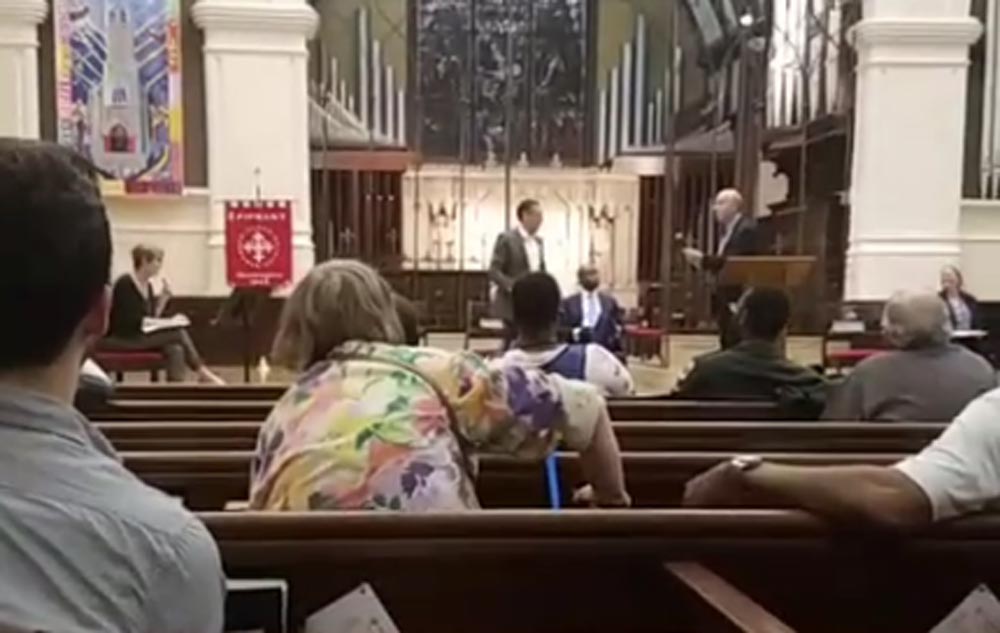A group of individuals formerly or currently experiencing homelessness held a forum May 4 for D.C. mayor and council chair candidates at the Church of the Epiphany, in downtown D.C. The questions centered on one simple theme: “What would you do to build more universally affordable housing?”
[Disclosure: Street Sense Media rents office space from the Church of the Epiphany]
The candidates’ answers featured policy remedies, such as rent control, improved quality of homeless shelters and increased funding for the D.C. Housing Production Trust Fund, while also highlighting the necessity for a more efficient working relationship between the D.C. Council and the mayor’s office. The ideological divide between the candidates that emerged over the course of the night was between those who plan to increase funding for various affordable housing initiatives and those who believe D.C. can achieve its housing goals by more efficiently spending tmoney it has already allocated.
On one side of this debate, Phil Mendelson, the incumbent D.C. Council chair, emphasized that the council should not “dump money into programs” without first examining its current spending. He said the $250 million that D.C. spends annually on affordable housing could be better targeted.
James Butler, a current Ward 5 advisory neighborhood commissioner and a mayoral candidate, said that if D.C. can spend money for speed cameras “on every corner,” then it can afford to allocate more money for crime cameras that would keep neighborhoods safe. Ed Lazere, executive director of the D.C. Fiscal Policy Institute and Mendelson’s primary opponent for council chair, called for doubling D.C.’s current spending on affordable housing.
The Trust Fund supports projects that produce and preserve affordable housing in the District, and it is itself fed jointly by the D.C. general fund and the District’s deed transfer and recordation tax. The Trust Fund has contributed to the development of 9,900 affordable housing units since its inception. It failed, however, to meet the requirements for a certain number of units to be affordable to the lowest-income families in 2014 and 2015, according to data from Lazere’s own D.C. Fiscal Policy Institute. Mayoral Green Party candidate Ann Wilcox stressed that the Trust Fund needs more funding. Mendelson asserted that the Trust Fund already wastes millions of dollars a year because of inefficiencies.

An audience question regarding D.C. General, the homeless shelter housed in the former D.C. General Hospital, drew heated replies from several candidates. Mayor Muriel Bowser announced in January plans to shutter the shelter, which has been plagued by controversy, by the end of the year. Construction has begun on smaller shelters in every ward, but none will be completed by the time D.C. General is closed, so the fate of current residents is unclear.
Butler argued that it was improper to shut down D.C. General without a “dignified” alternative for those living there. Mendelson said that while he originally supported the mayor’s plan to replace D.C. General with smaller shelters, he does not support the move to close it before the ward-based shelters are open. Wilcox argued that D.C. General needs to be closed, while Lazere called Bowser’s initiative bold and brave yet flawed in its execution.
Throughout the night, the candidates emphasized their credentials as advocates for people who are homeless. Butler pointed to his background as a civil rights lawyer, Lazere to his work with the D.C. Fiscal Policy Institute, and Wilcox to her work with Rachel’s Women’s Center. Mendelson pointed to past achievements as council chair, such as when he exposed the underselling of a publicly owned building that was being converted into affordable housing to garner the city an additional $2 million. He also pointed out that he was the only incumbent candidate “who felt it was important to be here.”
Mayor Muriel Bowser was invited but did not attend. When audience members asked the moderator “what excuse” Mayor Bowser had given for her absence, forum planners answered that she had not responded to phone calls.
Watch clips of the forum on Street Sense Media’s Facebook page








